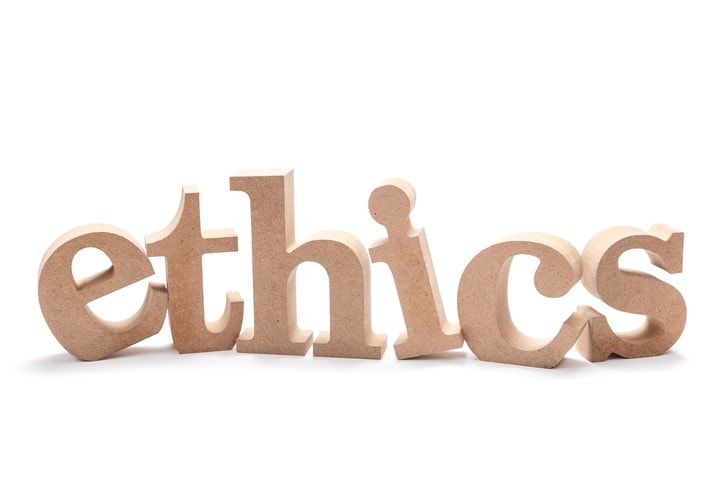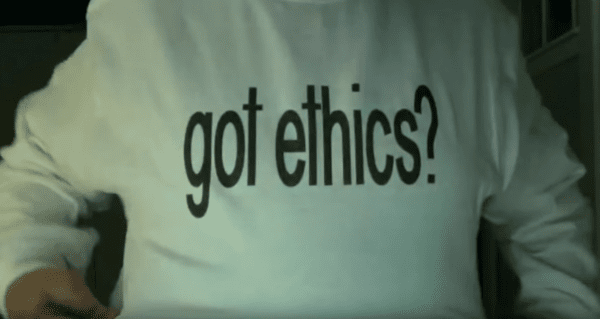/ News Posts / Ethical Issues and Conundrums in Music Education
Got Ethics?
Ethical Issues and Conundrums in Music Education
By NAfME Member Paul K. Fox
© 2019 Paul K. Fox
Don’t try ducking these essential questions on ETHICS!
- What in the world is “The Code”?
- How do ethics inform a teacher’s personal and professional actions?
- What does it mean to be a “moral exemplar” or “role model” in the community?
- How and why should teachers control their public “brand,” reputation, or persona?
- When was the last time you reviewed your state’s code of ethics?
One more question: Are you able to navigate that sometimes “foggy” pathway towards understanding the overlapping concepts of:
- Personal morality? (values and beliefs derived from an individual’s life experiences)
- Regulations of law? (policies, statutes, and judicial activity)
- Professional ethics? (standards that guide decision-making)
- Professional dispositions? (agreed-upon attitudes, values, and beliefs held by educational practitioners)
With serious allegations of professional misconduct, incidents of sexual harassment or discrimination in the workplace, or violations of trust involving CEOs, managers/supervisors, celebrities, politicians, and even teachers in the news every week, now might be a good time for a “refresher course” on school ethics . . . that is, if you ever had one! (From personal experience, nearly all of the music teachers I polled during the last two years of our local fall marching band festivals and halftime shows admitted to me that they had never seen our state’s “code of professional practices and conduct.”)
Regardless of whether you are a music education major, first-year teacher recently hired or transferred, or someone who has had many years of experience, little in-service training is provided for you to resolve perplexing contradictions in the moral decision-making “compass” expected of all educators.
So, what are you waiting for? Let’s “get ethics!”
As an introduction, the absolutely best set of definitions and example of “The Code” comes from the National Association of State Directors of Teacher Education Certification in “Model Code of Ethics for Educators.” Their core principles:
- Responsibility to the Profession
- Responsibility for Professional Competence
- Responsibility to Students
- Responsibility to the School Community
- Responsible and Ethical Use of Technology
Download and read the complete document. See an annotated list of activities related to the endorsement, adoption, or use of the MCEE by jurisdictions, educator preparation programs, and local education agencies.
Then, make sure you are familiar with your own state standards . . . ethics, conduct, and/or discipline codes.
Inconsistencies and even paradoxes regarding the language and practice of teacher ethics are prevalent across different state, county, and district lines. For example, a teacher might be advised to never have a closed-door counseling session alone with a student (promoting a possible inappropriate relationship?), while in another jurisdiction, the recommendation may be to only promote private one-on-one meetings for confidentiality concerns (Family Education Rights and Privacy Act). A veteran teacher may solve this apparent discrepancy by meeting with a student in a room with windows that offers privacy but allows for possible interruptions and direct sight-lines.
As you would imagine, Hollywood does not offer much clarity on the subject of ethics. Do you remember “Mr. Holland’s Opus,” a 1995 American drama directed by Stephen Herek and written by Patrick Sheane Duncan? Starring Richard Dreyfuss in the leading role of a music educator, our hero “Glenn Holland” was a musician and composer who took a teaching job to “pay the rent” while, in his spare time, he strived to achieve his true goal—compose one memorable piece of music to leave his mark on the world. As the years unfold, Holland soon discovers that the joy of sharing his contagious passion for music with his students becomes his new definition of success, at least until he is forced into retirement, and the school board decides to eliminate music from the curriculum.
However, viewing that 15-minute segment with his student Rowena, this movie is also a “classic” demonstration of the “slippery slope” leading to a totally inappropriate student-teacher relationship. Many say that Mr. Holland should have been fired from teaching and even “arrested for sexual misconduct!” Had I even considered taking a female student of mine to a bus stop to travel to New York to seek her “fame and fortune” without the knowledge of her parents, and kissed her good-bye, I would have been “tarred and feathered” and “ridden out on a rail . . . ”
Another movie brutally exposes the question, “Is it ever ethical or in the students’ best interest to ignore an existing rule?” “Lean on Me,” written by Michael Schiffer and directed by John G. Avildsen, starred Morgan Freeman as Principal “Crazy Joe” Clark trying to clean up Eastside High School and get his students to pass the minimum proficiency exams. Knowing he is breaking the fire code, Clark orders all doors chained during school hours to keep drug dealers out and enlists security guards to prevent the fire chief from enforcing the law. His unusually ruthless methods lead him to clash with numerous teachers and his vice principal, and eventually, he is jailed, and the superintendent is pressured to remove him. This biographical film begs the question, “Does the end ever justify the means?”
It’s time to put on your thinking caps! What are your initial impressions of a few more “conundrums”? How could these incidents lead to violations of law, your “moral professionalism,” and/or ethical code, or other state/district policies? In each situation, what are some potential negative consequences for the teacher and the student?
- Acceptance of congratulatory “musical hugs” versus the practice of avoiding all physical contact with students?
- Refusal of gifts from music industry vendors versus acceptance of “free” offers or dinner meetings?
- Publicly maligning a colleague’s questionable actions (character assassination) versus protecting your reputation and standing up for your students’ rights.
- Use of social media networks to support student learning versus the risk of crossing the student/teacher boundary with inappropriate informal communications?
- The sharing of anecdotes or details of an incident that occurred during a class or school activity with family members or colleagues?
- Communications with parents versus resolving disputes with “stage mothers.”
- The exercise of a teacher’s “freedom of speech” rights versus maligning school administrators or their decisions in public?
- The exercise of a teacher’s “freedom of expression” rights in having tattoos, body piercings, or wearing certain fad or provocative clothing versus compliance to school policies and norms?
Where are the answers? Just in time, two new videos have been added to the NAfME Academy Professional Development Library to explore the professional nature of teachers’ relationships with students, parents, and other professionals, appropriate student-teacher boundaries, the rationale and values set forth in sample educator codes of professional practice and conduct, a review of conflicts in pedagogy, enforcement, and resource allocation, and common ethical dilemmas and avoidance of unacceptable appearances/actions in the daily decision-making of music educators.
The framework for ethical decision-making has no easy solutions or hard-and-fast rules, and a lot is open to interpretation. Hopefully, these Academy webinars will “make you think a little” about these divergent concerns and perhaps warn you about the need to be proactive and consider a few modifications of your behavior in order to avoid possible conflicts or even the resemblance of improprieties.
“It’s Essential, Not Sexy – Ethics 101 for Educators” (Video #1)
Do you know what it means to be a “fiduciary”? What do the terms “slippery slope,” “moral professionalism,” or “The Code” have to do with teaching? “Thou shalt not stray!” as we take a moment to review and share new perspectives in definitions, problems, research, recommendations, and real-time scenarios of ethical decision-making in education.
“Resolving Dissonance! Ethical Decision-Making in Music Education” (Video #2)
From the real-life experiences of rookie to veteran educators, here are additional tips for maintaining the highest standards and appearances of professionalism, moral aspirations, ethics, and codes of conduct in the workplace. We will “empanel the jury” to assess and trouble-shoot ethical disputes requiring problem-solving, refining “best practices,” and evaluating unique case studies of music teachers.
About the author:
 Paul K. Fox, a NAfME Retired Member, is Chair of the PMEA State Council for Teacher Training, Recruitment, and Retention. He invites you to peruse his “ethics in music education” blog-series (in reverse chronological order).
Paul K. Fox, a NAfME Retired Member, is Chair of the PMEA State Council for Teacher Training, Recruitment, and Retention. He invites you to peruse his “ethics in music education” blog-series (in reverse chronological order).
Interested in reprinting this article? Please review the reprint guidelines.
The National Association for Music Education (NAfME) provides a number of forums for the sharing of information and opinion, including blogs and postings on our website, articles and columns in our magazines and journals, and postings to our Amplify member portal. Unless specifically noted, the views expressed in these media do not necessarily represent the policy or views of the Association, its officers, or its employees.
Catherina Hurlburt, Marketing Communications Manager. April 24, 2019. © National Association for Music Education (NAfME.org)
Published Date
April 24, 2019
Category
- Collegiate
- Professional Development
Copyright
April 24, 2019. © National Association for Music Education (NAfME.org)







